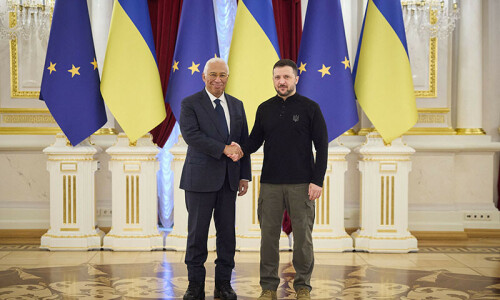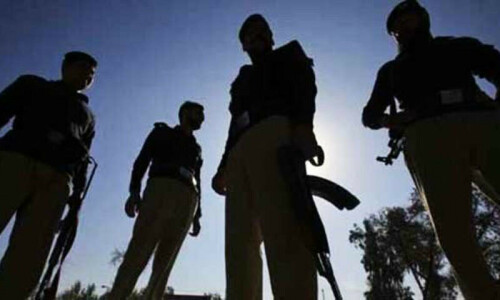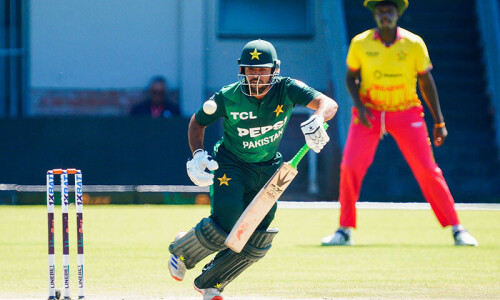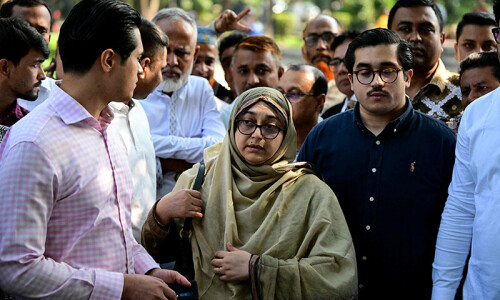It was sometime in the middle of 2006, when the first indigenous Hindi film was under production in the UAE. The situation required a saintly looking person to lip sync to a hamd (hymn) rendered by singer/composer Adnan Sami Khan. Subsequently, the most senior actor from Pakistan was called upon.
The producer, of Indian origin, complained about his experience concerning the so-called ‘attitudes’ of actors from Pakistan. When the veteran in question arrived for the shoot, in order to show his true character, he politely declined his payment at the end of the day. “Just remember that a Pakistani worked in your film for free,” was his only reply.
The movie titled Rehguzar was Dubai television’s serial-maker Faruq Masudi’s directorial debut, and the hamd, Allah Hu, was filmed in the desert area of Dubai. The actor whose kind gesture won over all and sundry was none other than the legendary Muhammad Qavi Khan.

Actors such as Qavi Khan are born once in a century. Every film industry has one such actor who excels in doing difficult roles that come his way. Bollywood had the veteran Pran, Hollywood had Anthony Quinn, while Pakistan had Qavi Khan throughout the ’70s and the ’80s.
With over 250 films, hundreds of TV plays and thousands of stage performances under his belt, Muhammad Qavi Khan, who passed away March 5, defined an era of Pakistani acting
Qavi Khan could easily mould his personality according to the requirements of the filmmaker. With Allaudin and Talish graduating to character roles, the skinny boy from Peshawar came of age and did roles that required maximum flexing of acting muscles. Equally good as a protagonist and an antagonist, Qavi remained unrecognisable as the father of the lead characters, despite being only in his 30s.

Qavi was at ease while performing — he would transform into his characters seamlessly and his body language and facial expressions all fell in sync, whether he was playing a friend to a much-senior Muhammad Ali or a year junior to veteran actor Nadeem (Qavi played his roommate in 1970’s Baazi, became his father in 1972’s Ehsaas, was his elder brother in 1973’s Nadaan and returned to play his father, after getting into the skin of the character, in 1977’s Sachchai).
The same stood true with Waheed Murad (Naag Mani/Mulaqaat) and Shahid (Pyaasa/Purdah Na Uthao) where Qavi convincingly played the friend and the father. One would be surprised to see the range of characters he played in films: feudal baron, peasant, lawyer, police officer, thief, mad scientist, spoilt brat, womaniser, doctor, undercover agent, maulvi and even a priest. He had no qualms in playing historical figures such as Muhammad Ali Jinnah in a film, or the legendary poet Mirza Ghalib on TV.

Qavi Khan was cast as the hero in the first-ever play broadcast from Pakistan Television (PTV) Lahore in 1964. Directed by Fazal Kamal, Qavi played the lead against Kanwal Naseer. He continued to work in theatre, shuttling between TV and films.
Police officials used to salute him for his portrayal as the no-nonsense DSP Tahir Ali in Andhera Ujala. The success of the character prompted him to contest the 1985 non-party elections in the country, but he found it to be a very different playing field.

Although he was associated with a foreign bank in the early part of his career, he was asked to resign after serving them for seven years. The joke was people would come to the bank for an autograph by Qavi Khan rather than putting their signature on a form to open a bank account.
In the late ’60s, he was one of the three lead characters in the comedy show Laakhon Mein Teen on TV. The 1970s saw more of him in films than TV, but after registering more flops than hits as a producer, Qavi Khan returned to his roots. He was a broken man when his film Aik Sitam Aur Sahi, written by Bano Qudsia and directed by Sangeeta, was canned.

Further encounters with the censors for Pasbaan ended his dream to turn to production. Those were the days where martial law was in place and challenging a regime as powerful as Gen Ziaul Haq’s was completely out of the question.
The second time round on TV, Qavi Khan portrayed immortal characters on TV. Who can forget the elderly man living alone with his wife in PTV’s long play Daur-i-Junoon? Be it a champion hockey player in Paiman-i-Wafa, Faqeer Hussain in Dehleez or even Wajid Khan, the helpless father of Seemi Zaidi’s character Sapna, he made us believe whatever character he was playing.

Rahat (played by Qavi himself), the wannabe actor who copied Muhammad Qavi the actor in Mirza and Sons, was the most hilarious of all. The filmi body movements, the throws in his voice and the way he carried the mood of the superstar could only be done by Qavi. The most incredible part in his acting career was getting praised by the law enforcers after working in the Lahore production Andhera Ujala.
Police officials used to salute him for his portrayal as the no-nonsense DSP Tahir Ali in the series. The success of the character prompted him to contest the 1985 non-party elections in the country, but he found it to be a very different playing field. He was every writer’s dream, be it veterans such as Amjad Islam Amjad, Munnu Bhai, Anwar Maqsood or actor-turned-writer Waseem Abbas.

“Qavi Khan sahib was an all-rounder,” recalls Waseem Abbas, who had an association with the late Qavi stretching back to his debut days. “Be it TV, film or theatre, he was a big help. Being a producer himself, he knew the problems a producer faces. Be it my first feature film as a lead, Manzil [1981], or my first project as a writer, Lahori Gate [2007], Qavi sahib was a must to have around. He played the role of my father in Din [1992] and was also there in Raiza Raiza [1995]. An immensely talented actor, he was an example for all other actors to follow.”
With over 250 films, hundreds of TV plays and thousands of stage performances, Qavi Khan died with his boots on. Supposed to play the role of Haji Karamat in the serial Yunhi, he fell ill and left with his son for Canada. Veteran actor/producer Manzoor Qureshi stepped in his place, and some of the scenes Qavi had already shot were replaced. The viral video on social media, with Behroz Sabzwari and director Ehteshamuddin celebrating Qavi Khan’s 80th birthday on the set says it all.

Behroze Sabzwari, the child artist of the ’70s who has turned to character roles now, believes that the acting fraternity has lost its father figure. “I was fortunate enough to be associated with Qavi sahib in television, films and stage. I can never forget the amazing trip we made to Australia in 2017 to stage Taleem-i-Balighan. He was a gem of a person, who always believed in spreading love,” remembers Behroze, who says he literally grew up watching Qavi sahib perform.
In PTV’s Taleem-i-Balighan, Qavi Khan played the role of a dhobi (washerman). Comedian Ayaz Khan, who played the role of Khan Sahib in the play, was also short of words at the thespian’s death.
“We are lucky to have had people such as Qavi Khan in our lives. Although I never worked with him on TV, I got close to him during the rehearsals of Taleem-i-Balighan. The first show, basically a trial, was held in Lahore in 2017 and, later that year, we all performed the drama in Sydney. It was during rehearsals usually held at the house of Qavi sahib in Karachi, that I got to know him closely. He was not only a wonderful host but a lovely human being as well. I was ashamed to know [listening to one-sided telephone calls he received during the rehearsals] that even actors of the calibre of Qavi sahib were not paid on time,” complains Ayaz Khan.
Qavi Khan, PTV’s first hero, was also the lead in the first private production serial shot abroad. In the year 1993, he played the legendary poet in Mirza Ghalib America Mein, filmed in Washington DC. Produced by Pakistan-born American actor Noor Naghmi, Anwar Maqsood was the serial’s director and writer.
“Anwar bhai wrote the script in the style he is known for,” reminisces Noor Naghmi, who debuted as a child artist on PTV’s first programme for children, Hawai Qilla, the same day Qavi made his acting debut. “The concept was unusual. For instance, when my character decides to take Mirza Ghalib home, he requests to meet the ‘Dipti Commissioner’. On clarifying that we don’t have such officers in the US, Mirza Ghalib asks, ‘Phir yeh Washington ke aagay DC kyun laga hua hai? [Then why is DC attached to Washington?]’. Sadly, the serial is not available on YouTube, otherwise the present generation would have loved it,” adds Naghmi.
Qavi Khan also worked in Pakistan-American filmmaker Iram Parveen Bilal’s I Will Meet You There in 2020, where he was pitted against Pakistan-born American actor Farhan Tahir. Not even he could have imagined that a child artist who debuted from Peshawar Radio in 1952 would one day act in an American film production.
Qavi Khan led a complete life with no regrets. To honour one of its greatest actors, Pakistani television history may well be divided into two ages: the one when Qavi lived, and the other which begins after Qavi.
Published in Dawn, ICON, March 12th, 2023














































Dear visitor, the comments section is undergoing an overhaul and will return soon.